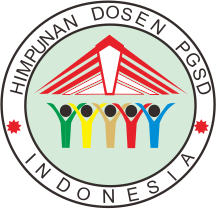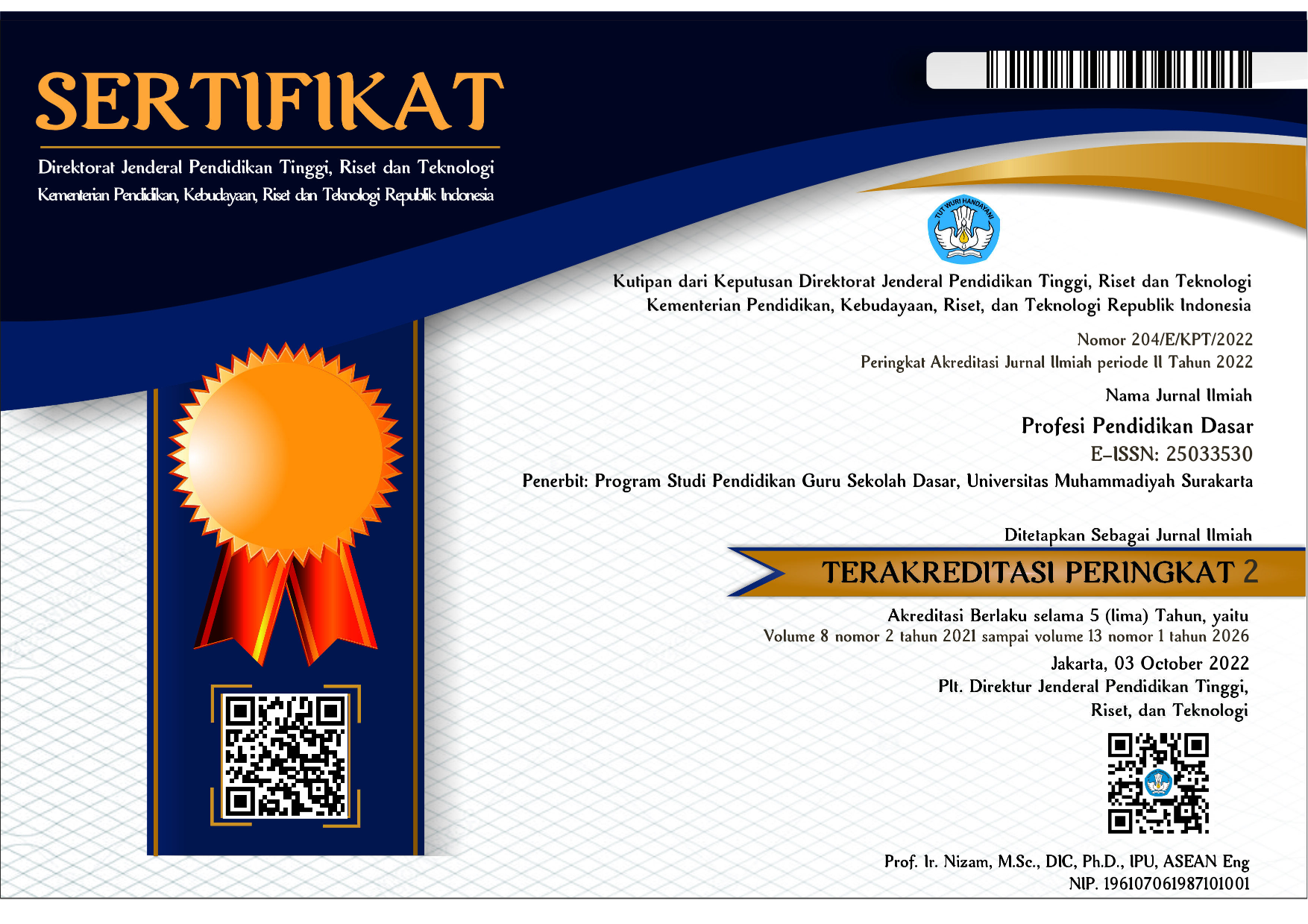Apakah Learning Start with a Question Efektif Digunakan dalam Microteaching?: Eksperimen pada Calon Guru Sekolah Dasar
Nina Gantina(1), Ahmad Khoiri(2*)(1) STKIP Banten
(2) Universitas Sains Alqur'an
(*) Corresponding Author
Abstract
Keywords
Full Text:
PDFReferences
Achdiani, Yani, and Ayu Rusliyani. 2017. “Pengetahuan Keterampilan Dasar Mengajar Dalam Menyiapkan Guru Sekolah Menengah Kejuruan.” Teknobuga 5(2):34–43.
Akkaya, Nevin, and M. Volkan Demirel. 2012. “Teacher Candidates’ Use of Questioning Skills in During-Reading and Post-Reading Strategies.” Procedia - Social and Behavioral Sciences 46:4301–5.
Blömeke, S., & Delaney, S. (2012). Assessment of teacher knowledge across countries: a review of the state of research. ZDM, 44(3), 223–247.
Chin, Christine, and Jonathan Osborne. 2008. “Students’ Questions: A Potential Resource for Teaching and Learning Science.” Studies in Science Education 44(1):1–39.
Crisp, D. A., Rickwood, D., Martin, B., & Byrom, N. 2020. “Implementing a Peer Support Program for Improving University Student Wellbeing: The Experience of Program Facilitators.” Australian Journal of Education 64(2):113–126.
Etemadzadeh, Atika, Samira Seifi, and Hamid Roohbakhsh Far. 2013. “The Role of Questioning Technique in Developing Thinking Skills: The Ongoing Effect on Writing Skill.” Procedia - Social and Behavioral Sciences 70:1024–31.
Isrokatun, I., A. A. Syahid, H. E. Putri, J. Julia, and C. Sunaengsih. 2019. “Problem Posing Skill of Elementary School Students.” Journal of Physics: Conference Series 1318(1).
Khoiri, Ahmad. 2020. “Analisis Kritis Pendidikan Sains Di Indonesia: (Problematika, Solusi Dan Model Keterpaduan Sains Dasar).” SPEKTRA : Jurnal Kajian Pendidikan Sains 6(1):19.
Khoiri, Ahmad, and Widha Sunarno. 2019. “How Is Students’ Creative Thinking Skills ? An Ethnoscience Learning Implementation.” Jurnal Ilmiah Pendidikan FisikaAl-BiRuNi 08(October):153–63.
Kinyanjui, Mary Wangari, Peter J. O. Aloka, Sabina K. Mutisya, Florentina
Ndunge Ndeke, and Naphtal Michira Nyang’ara. 2015. “Classroom Reinforcement Schedules and Their Effectiveness in Selected Kenyan Primary Schools.” Journal of Educational and Social Research (September).
Kristiana, Dini, Dan A. Muhibbin Magister, Administrasi Pendidikan, and
Sekolah Pascasarjana. 2018. “Keterampilan Dasar Mengajar Dalam Pembelajaranmatematika Di Smp.” Jurnal Managemen Pendidikan 13(2):204–9.
Leng, Jinsong, and Chee Peng Lim. 2011. “Reinforcement Learning of Competitive and Cooperative Skills in Soccer Agents.” Applied Soft Computing Journal 11(1):1353–62.
Mansur, Nurdin. 2017. “Penerapan Keterampilan Mengajar Dalam Upaya Pencapaian Hasil Belajar Mahasiswa.” Lantanida Journal 4(2):118.
Mansyur. 2017. “Keterampilan Dasar Mengajar Dan Penguasaan Kompetensi Guru (Suatu Proses Pembelajaran Micro).” El-Ghiroh XII(1):130–46.
Muttaqin, Muhamad Fauzan, and Tri Joko Raharjo. 2018. “The Implementation Main Values of Character Education Reinforcement in Elementary School.” Journal of Primary Education 7(1):103–12.
Niswati, Fadilah Ismiya, and Ika Candra Sayekti. 2020. “Analisis Kompetensi Pedagogik Calon Guru Sekolah Dasar Dalam Mata Kuliah Microteaching.” Profesi Pendidikan Dasar 1(1):1–14.
Nurlaili, Nurlaili. 2018. “Analisis Keterampilan Dasar Mengajar Guru Dalam Perspektif Guru Pamong Pada Mahasiswa Prodi PGMI Fakultas Ilmu Tarbiyah Dan Keguruan UIN Raden Fatah Palembang.” JIP: Jurnal Ilmiah PGMI 4(1):28–40.
Nurwahidah, Indri. 2020. “Kemampuan Keterampilan Dasar Mengajar Mahasiswa Calon Guru Ipa Program Studi Pendidian Ipa.” EduTeach : Jurnal Edukasi Dan Teknologi Pembelajaran 1(2):22–33.
Oliver, Regina M., Joseph H. Wehby, and J. Ron Nelson. 2015. “Helping Teachers Maintain Classroom Management Practices Using a Self-Monitoring Checklist.” Teaching and Teacher Education 51:113–20.
Pamuji. 2019. “Peningkatan Kemampuan Menjelaskan Materi Pkn Tentang Asean Melalui Model Pembelajaran Mind Mapping Pada Siswa Kelas VI SDN Ringinkembar 03.” JURNAL PENA SD 03(01):88–98.
Raharja, Steven, et. a. 2018. “Mengukur Rasa Ingin Tahu Siswa.” Journal Of Language, Literature, Culture, And Education POLYGLOT Vol. 14 No.2.
Sari, Nurhaty Purnama, and Wilda Fasim Hasibuan. 2019. “Teacher’s Questioning Skills and Students’ Responses in Science Subject Based on Parenting Style Perspectives.” Jurnal Pendidikan Biologi Indonesia 5(1):85–92.
Satria, Oki Anggit, Budi Waluya, and B. Siswanto. 2018. “Model Discovery Learning Bernuansa Hypnoteaching Untuk Meningkatkan Kemampuan Mathematical Reasoning Dan Rasa Ingin Tahu Siswa.” PRISMA, Prosiding Seminar Nasional Matematika 1:669–76.
Seman, Shamilati Che, Wan Mazwati Wan Yusoff, and Rahimah Embong. 2017. “Teachers Challenges in Teaching and Learning for Higher Order Thinking Skills (HOTS) in Primary School.” International Journal of Asian Social Science 7(7):534–45.
Solfema, Solfema, and Syafrudin Wahid. 2018. “Peer Group Learning Method to Improve the College Student’s Achievement.” Journal of Nonformal Education 4(2):187–96.
Suganda, Rizky, Endro Sutrisno, and Irawan Wisnu Wardana. 2017. “Upaya Peningkatan Kemampuan Siswa Dalam Menjelaskan Perkembangan Teknologi Komunikasi Dan Transportasi Melalui Penerapan Metode Kooperatif Jigsaw.” Jurnal Cakrawala Pendas 53(9):44–52.
Sugiyono. 2013. Metode Peneltian Kualitatif Dan R & D. Bandung: Alfabeta.
Sukirman, Dadang. 2012. Pembelajaran Micro Teaching. Direktorat Jenderal Pendidikan Islam Kementerian Agama.
Sumiah, N., Aminuyati, and F. Y. Khosmas. 2013. “Analisis Keterampilan Mengajar Guru Dalam Meningkatkan Hasil Belajar Pada Mata Pelajaran Ekonimi Di SMA.” Jurnal Pendidikan Dan Pembelajaran 2(9):1–17.
Suprijino, Agus. 2015. Cooperative Learning. Yogyakarta: Pustaka Pelajar.
Usman, M. Uze. 2010. Menjadi Guru Profesional. Bandung: PT Remaja Rosdakarya.
Vani, Siti, Et. a. 2015. “Pengaruh Model Learning Start With A Question Berbasis Eksperimen Sederhana Terhadap Pemahaman Konsep Fisika Kelas X Man 2 Model Palu.” Jurnal Pendidikan Fisika Tadulako (JPFT). Vol. 5. No. 2.
Zulkifli, Hafizhah, and Rosnani Hashim. 2019. “The Development of Questioning Skills through <I>Hikmah</I> (Wisdom) Pedagogy.” Creative Education 10(12):2593–2605.
Article Metrics
Abstract view(s): 901 time(s)PDF: 624 time(s)
Refbacks
- There are currently no refbacks.


















